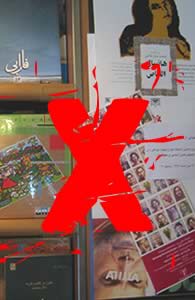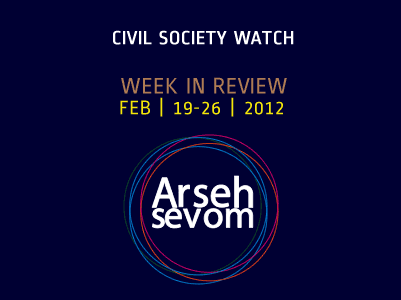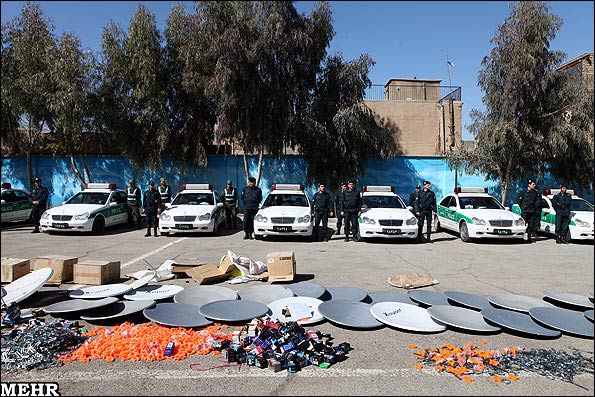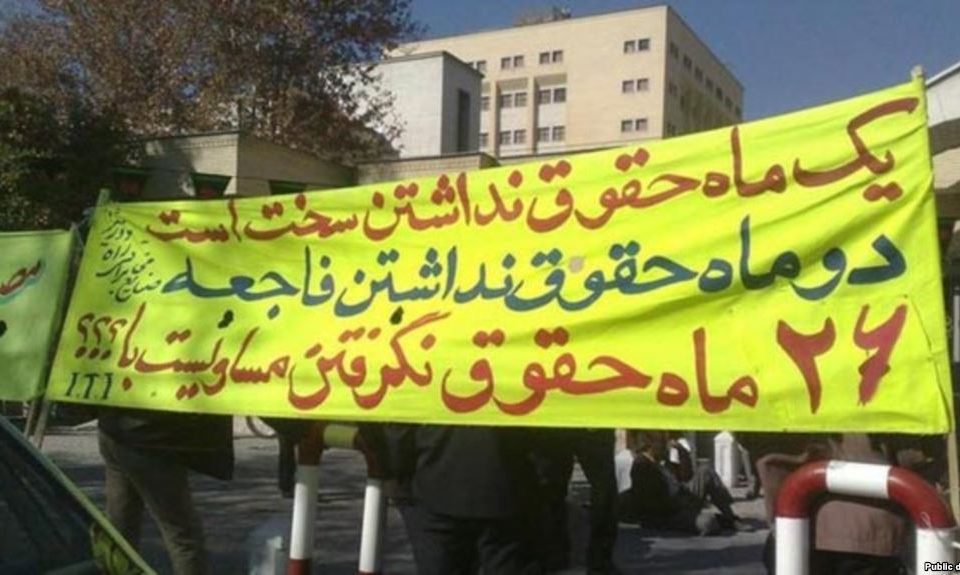
Publisher Banned for Undisclosed “Wrong Doing”
February 23, 2012
Threat of War, Press TV Attacks, Parliamentary Elections, Amnesty Reports
March 6, 2012Iran’s Civil Society in the News: Arseh Sevom Round-up of Top Stories from the Week of February 19-25
Contents
Hunger Strikes and Heresy: Prisoners of Conscience in Danger
Opposition Calls for Voters to Stay Home
The Call for Free and Fair Elections
Jammin’ and Jammin’ and Jammin’… Jam No More
Coming to Your TV: Iran’s Outrageous Confession Videos
Strangling the Internet
More Pressure on the Baha’i
Sixty Percent of Workers Under the Poverty Line
Publishers Come Under Scrutiny: “Censorship reflects a society’s lack of confidence in itself”
How can we not start with a great big congratulations to Asghar Farhadi, the director of A Separation, for his historic Oscar win? Congratulations!
Arseh Sevom also notes that Sunday, February 26, marked Lawyer’s Day in Iran. With dozens arrested, persecuted, and imprisoned for their work defending the rights of others, being a lawyer in Iran can be hazardous. Arseh Sevom salutes those lawyers who have so bravely stood up for the rights of others. (Details of the harassment of lawyers can be found here.)
In the lead up to parliamentary elections in Iran, there is increased pressure on civil society. Mountain climbers have been arrested in Sanandaj, publishers are being scrutinized, and prisoners of conscience challenge their detention.
With less than a week left before the elections, the mood domestically and internationally is becoming more hawkish and militaristic. On election day, March 2nd, 85,000 members of the Basij militia will be dispatched to the streets. This is all being played out amidst worldwide speculations of an imminent attack on Iran. (For more, see Al Jazeera’s Listening Post).
Hunger Strikes and Heresy: Prisoners of Conscience in Danger
Iranian blogger, physician and son of a senior cleric, Mehdi Khazali, has passed 48 days of a hunger strike serving a prison term his aged father, Ayatollah Abolghasem Khazali,staunchly supports. In what appears to be his last will Mehdi Khazali has written to his family stating: “Now that I am writing these lines I have cried so much over your hardships and anguishes that no dry spot is left on my pillow….” In the event of his death, Khazali has demanded that “UN appointed doctors perform an autopsy on [his] corpse” as he does not trust the prison medical examiners.
Following the reaffirmation of the death sentence for Yousef Nadarkhani, an Iranian pastor who converted to Christianity, there has been international condemnation and requests for his immediate release. The charge against Nadarkhani, according to a copy of the verdict posted on his Facebook support page is: “heresy.”
Opposition Calls for Voters to Stay Home
Calls for a boycott of elections are nothing new in the 32-year lifetime of the Islamic Republic, but this time there is a difference. Nearly all opposition factions have asked people to stay in their homes on election day. The opposition coordination council of Rahe Sabz Omid (Green Path of Hope) has stated:
“We were of the belief that it is only in history books that we read people are killed for demanding their democratic rights; yet we have become a part of history ourselves…How can we participate in elections when our youths were murdered after the [2009 Presidential] election while only asking for their votes?”
Calls for Free and Fair Elections
In addition to a boycott some civil society organizations are calling free and fair elections. The Green Voice of Freedom states:
“By holding completely flawed and engineered elections, the Islamic Republic of Iran has created an atmosphere that does not provide any guarantees for holding untainted free and fair elections. This has deprived a majority of Iranian people, including many in the political class, from participating in the elections.”
“It’s not the voting that’s democracy, it’s the counting”
Activists and analysts are voicing concerns over the possibility of yet another round of “engineered elections” and the fabrication of false turn-out statistics. United4Iran issued a statement last week, stating their concerns:
While the Iranian government claims to hold democratic elections, the country ranks at the bottom of the world’s leading independent democracy assessments. According to the Economist Intelligence Unit’s Democracy Index for 2011, Iran was designated as an “authoritarian” state and ranked 159 out of 167 following an analysis of 60 democracy indicators – lower than China, Sudan, and Syria. The country received the lowest possible score in the category of “electoral process and pluralism” – a zero.
Leader Predicts an “Enemy-Crushing” Turnout
An opposition website, Neday-e Sabz-e Azadi (The Green Voice of Freedom) points to Ayatollah Khamenei’s recent rhetoric:
In a system where all roads end with the leader, it is natural that all polls, evidence, and facts must be in line with Ayatollah Khamenei’s views. [So when the leader says:] “According to my experience from this people’s behavioral pattern as well as my trust in God’s attention, I predict that…the turn-out will be of an enemy-crushing participation. These elections help pump fresh blood into the body of the Islamic Republic….” This ‘prediction’ by the Islamic Republic’s leader [must be deemed as] an alarming sign.
Neday-e Sabz-e Azadi quotes other high-ranking Iranian officials following in Khamenei’s footsteps with predictions of high turnout rates starting from 60% and reaching as high as 80%. This is reminiscent of predictions in the days leading up to the disputed 2009 presidential elections.
Jammin’ and Jammin’ and Jammin’… Jam No More
Last week the UN agency for information and communication technologies, ITU, called on all states to track down and stop jamming satellite signals from locations inside their borders. The 22nd of February decision was stipulated within amendment to the current WRC-12 regulation and was widely welcomed by civil society and human rights activists focusing on Iran. Welcoming the new action, the spokesperson of the International Campaign for Human Rights in Iran, Hadi Ghaemi, said:
“ITU has now clarified Iran’s legal commitments completely. But the international community, including telecommunication companies such as Eutelsat, have to keep pushing the Iranian government to make sure that it stops jamming satellite signals.”
Following this announcement, Sadeq Saba, director of BBC Persian, stated that BBC Persian will resume its signal on Hotbird satellite, which is popular in Iran.
At the same time, Mehr News reports the police cracking down on satellite dishes and “unIslamic” materials in East Tehran. Photos show police throwing dishes from roofs, and confiscated satellite boxes.
Coming to Your TV: Iran’s Outrageous Confession Videos
The security apparatus of the Islamic Republic has issued a statement on a website associated with the Revolutionary Guards, Gerdab.ir, pertaining the arrest of BBC Persian and Radio Farda (Persian Broadcast service of RFE/RL) “agents” in Iran. The statement concluded:
“Soon […] evidence and documents of BBC’s organized communication with their agents in Iran will be released. This will be yet another proof of [our] intelligence dominance over the seditionists’ media stream. During the coming days the first part of a media documentary on the mentioned operation will be broadcast from the national television.”
Activists are warning of the possibility of another round of television interrogation shows in the making.
Strangling the Internet
Internet connection in Iran has been facing the same ordeal as last week’s with Yahoo and Gmail E-Mail services filtered for a few hours and then back online and bandwidth speeds reduced to minimum making this phase in Iranian internet censorship perhaps among the longest and most extensive since its peak of total disconnection in 2009 and during the Green Movement.
Read more by clicking here.
HRANA reports that police have closed down shops owned by members of the Baha’i faith in Semnan province in North-central Iran. The shops closed include those selling children clothes, glasses, and plastic-ware. This is a worrying sign of further crackdowns on religious and ethnic minorities. Arseh Sevom is concerned about the persecution of minorities in Iran. The number of Baha’i in prison and under pressure keeps rising and the threat of execution for those who convert from Islam is shocking and a gross violation of human rights.
More Limitations on Who Can Stand for Office: If Brazil’s former president Lula da Silva were Iranian he Wouldn’t be Allowed to Run
Earlier this month and just before the end of their terms at the ‘Majles’, Iranian parliamentarians passed an amendment to the election law that stipulates that in order to be eligible for service candidates must hold at minimum a Master’s Degree or its equivalent, or five years of executive service background in state or private organizations in “expert to more senior positions.” In a way to grandfather in existing parliamentarians who don’t meet these requirements, the amendment adds that “each term served at the parliament is equivalent to one educational degree.” The new law would makes it even more difficult for many, including workers, to stand in elections.
Radio Zamaneh reports that the Iranian MP and head of the House of Workers, Alireza Mahjoub, has criticized the new law stating that: “Today, with the additional eligibility criterion that parliamentary nominees must have a graduate degree, only one percent of the population can actually run in elections, and this is completely unfair.”
Sixty Percent of Workers Under the Poverty Line
The economy remains a primary concern for many Iranians. There are just three weeks left to the beginning of the new Persian year, Norooz, and many Iranian households are anxiously looking at the coming days wondering if their purchasing power is going to plunge even further as the Iranian Rial quickly depreciates.
Shargh newspaper quotes a member of the Islamic work council announcement that Iranian workers in 80% of manufacturing units receive wages under the minimum passed by the higher work council [currently around $173 per month]. Changiz Ghassemi points to the execution of Purposeful Subsides Bill as the culprit for the unlimited inflation and adds: “more than 60% of workers live under the poverty line.”
Publishers Come Under Scrutiny: “Censorship reflects a society’s lack of confidence in itself”
Despite censorship, Iran has managed to maintain a healthy number of bookstores and interest in reading. In December of 2011, however, a staggering 100 bookstores shut their doors for the last time, in part due to economic pressure. The bad news does not end there, unfortunately.
Nashre Cheshmeh, one of the most productive publishers was banned from publishing for no particular reason. The Union of Publishers and Bookstores, which is one of the oldest guilds in Iran, has had no response.
Bahman Dorri, the deputy ministry of Islamic Guidance in Cultural Affairs, gave a public interview in which he did not clarify the case of Nashre Cheshmeh and the reasons it’s been banned. He claimed that eight other “wrong-doing” publishers were under the surveillance of the “Board of in charge of supervising the wrong doings of publishers” and had been written in the “book of law” [sic].
Dorri never stated under which legal procedure this board was formed or who are its members. It also remains unclear whether or not the board includes publishers.
Dorri adds that most of the “wrong doing” of these publishers are “content-wise and structural” [sic.] and their licenses are now under legal review. Again, he did not mention any particular law. The system of censorship in Iran is not regulated. As a result, many of authors and translators are put in the position of defending the meaning of words they have uses and the reasons for words, phrases, and sentences in their work. In some cases it takes years to resolve the differences. After much debate, the Islamic Guidance Ministry doesn’t issue the license for the book or issues it only on condition that certain parts be omitted.
What is clear is that this new threat against publishers is part of a pattern identified by Arseh Sevom to replace independent organizations with those under state control. When viewed in the light of the closure of The House of Cinema, Iran’s motion picture guild, and other organizations, the censure and closure of Nashre Cheshmeh is an ominous sign of the ever increasing state control of all aspects of society.






